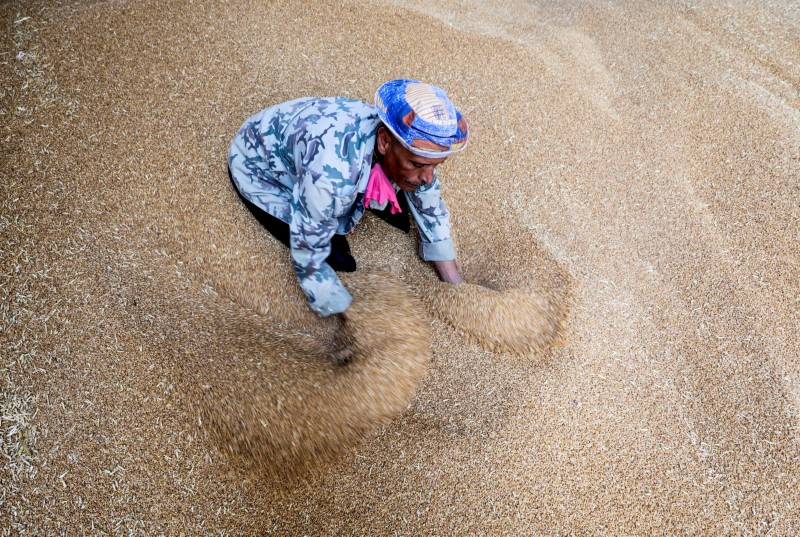/cloudfront-us-east-2.images.arcpublishing.com/reuters/3X2EJ257NBIO7A5RKBBV2DN6GM.jpg)

A worker collects wheat at the Banha grain silos in Qalyubia Governorate, Egypt, May 19, 2022. REUTERS/Mohamed Abd El-Ghany/File photo Obtain licensing rights
CAIRO (Reuters) – Egypt’s state grain company bought about half a million metric tons of Russian wheat in a private deal, four traders told Reuters, and succeeded in negotiating prices lower than those offered in conventional tenders.
Egypt, one of the world’s largest wheat importers, last year began switching to buying directly from tenders after the war in Ukraine disrupted its purchases.
Traders said the General Authority for Supply Commodities (GASC) bought about 480,000 metric tons of Russian wheat from Solaris Trading Company on Friday, at about $270 per tonne on a cost and freight basis.
It was not possible to obtain immediate comment from the General Authority for Supply Commodities.
Traders told Reuters the price may be lower than the unofficial floor set by the Russian government to control domestic wheat prices.
Other Russian wheat suppliers bid on Friday at an on-board price of $265 per metric ton, believing it to be the minimum price set, and the cost price exceeded $270 per metric ton.
Traders told Reuters that the minimum price is not legally binding, but that suppliers are expected to follow the instructions of the Russian Ministry of Agriculture.
There is uncertainty in the market regarding the level of the Russian minimum floor price.
Traders say there are different minimum prices for private sales and sales in public tenders, as well as different prices for sales each month between September and December, and discounts for lower-protein wheats.
In last week’s tender, all Russian suppliers bid at a set price of $270 per metric ton on an FOB basis, with C&F prices ranging from $286.25 to $291 per metric ton.
That affected the competitiveness of Russian wheat, traders told Reuters at the time, as GASC instead bought cheaper Romanian and French wheat.
GASC also privately bought one shipment of Bulgarian wheat at $270 per tonne including shipping costs on Friday.
After the war in Ukraine disrupted the country’s wheat exports, Egypt relied mainly on relatively cheap Russian grain.
Last year, Egypt’s supply minister said buying directly from suppliers enabled him to negotiate better prices in times of uncertainty.
The North African country is suffering from a foreign currency crisis after the Ukraine war sent a widespread shock to its economy, prompting it to start postponing payments for wheat.
The government recently signed a $500 million loan agreement with the Abu Dhabi Export Office (ADEX) to purchase imported wheat from the UAE-based Al Dahra Agricultural Company.
(Reporting by Sarah El Safty and Michael Hogan).
Our standards: Principles of Trust for Thomson Reuters.

“Web maven. Infuriatingly humble beer geek. Bacon fanatic. Typical creator. Music expert.”





More Stories
Dow Jones Futures: Microsoft, MetaEngs Outperform; Robinhood Dives, Cryptocurrency Plays Slip
Strategist explains why investors should buy Mag 7 ‘now’
Everyone gave Reddit an upvote